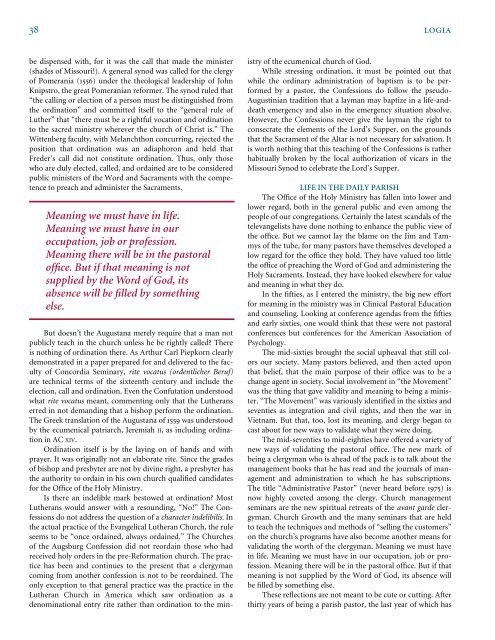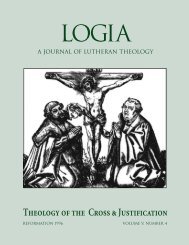Create successful ePaper yourself
Turn your PDF publications into a flip-book with our unique Google optimized e-Paper software.
38 logia<br />
be dispensed with, for it was the call that made the minister<br />
(shades of Missouri!). A general synod was called for the clergy<br />
of Pomerania (1556) under the theological leadership of John<br />
Knipstro, the great Pomeranian reformer. <strong>The</strong> synod ruled that<br />
“the calling or election of a person must be distinguished from<br />
the ordination” and committed itself to the “general rule of<br />
Luther” that “there must be a rightful vocation and ordination<br />
to the sacred ministry wherever the church of Christ is.” <strong>The</strong><br />
Wittenberg faculty, with Melanchthon concurring, rejected the<br />
position that ordination was an adiaphoron and held that<br />
Freder’s call did not constitute ordination. Thus, only those<br />
who are duly elected, called, and ordained are to be considered<br />
public ministers of the Word and Sacraments with the competence<br />
to preach and administer the Sacraments.<br />
Meaning we must have in life.<br />
Meaning we must have in our<br />
occupation, job or profession.<br />
Meaning there will be in the pastoral<br />
office. But if that meaning is not<br />
supplied by the Word of God, its<br />
absence will be filled by something<br />
else.<br />
But doesn’t the Augustana merely require that a man not<br />
publicly teach in the church unless he be rightly called? <strong>The</strong>re<br />
is nothing of ordination there. As Arthur Carl Piepkorn clearly<br />
demonstrated in a paper prepared for and delivered to the faculty<br />
of Concordia Seminary, rite vocatus (ordentlicher Beruf)<br />
are technical terms of the sixteenth century and include the<br />
election, call and ordination. Even the Confutation understood<br />
what rite vocatus meant, commenting only that the Lutherans<br />
erred in not demanding that a bishop perform the ordination.<br />
<strong>The</strong> Greek translation of the Augustana of 1559 was understood<br />
by the ecumenical patriarch, Jeremiah II, as including ordination<br />
in AC XIV.<br />
Ordination itself is by the laying on of hands and with<br />
prayer. It was originally not an elaborate rite. Since the grades<br />
of bishop and presbyter are not by divine right, a presbyter has<br />
the authority to ordain in his own church qualified candidates<br />
for the Office of the <strong>Holy</strong> <strong>Ministry</strong>.<br />
Is there an indelible mark bestowed at ordination? Most<br />
Lutherans would answer with a resounding, “No!” <strong>The</strong> Confessions<br />
do not address the question of a character indelibilis. In<br />
the actual practice of the Evangelical Lutheran Church, the rule<br />
seems to be “once ordained, always ordained.” <strong>The</strong> Churches<br />
of the Augsburg Confession did not reordain those who had<br />
received holy orders in the pre-Reformation church. <strong>The</strong> practice<br />
has been and continues to the present that a clergyman<br />
coming from another confession is not to be reordained. <strong>The</strong><br />
only exception to that general practice was the practice in the<br />
Lutheran Church in America which saw ordination as a<br />
denominational entry rite rather than ordination to the min-<br />
istry of the ecumenical church of God.<br />
While stressing ordination, it must be pointed out that<br />
while the ordinary administration of baptism is to be performed<br />
by a pastor, the Confessions do follow the pseudo-<br />
Augustinian tradition that a layman may baptize in a life-anddeath<br />
emergency and also in the emergency situation absolve.<br />
However, the Confessions never give the layman the right to<br />
consecrate the elements of the Lord’s Supper, on the grounds<br />
that the Sacrament of the Altar is not necessary for salvation. It<br />
is worth nothing that this teaching of the Confessions is rather<br />
habitually broken by the local authorization of vicars in the<br />
Missouri Synod to celebrate the Lord’s Supper.<br />
LIFE IN THE DAILY PARISH<br />
<strong>The</strong> Office of the <strong>Holy</strong> <strong>Ministry</strong> has fallen into lower and<br />
lower regard, both in the general public and even among the<br />
people of our congregations. Certainly the latest scandals of the<br />
televangelists have done nothing to enhance the public view of<br />
the office. But we cannot lay the blame on the Jim and Tammys<br />
of the tube, for many pastors have themselves developed a<br />
low regard for the office they hold. <strong>The</strong>y have valued too little<br />
the office of preaching the Word of God and administering the<br />
<strong>Holy</strong> Sacraments. Instead, they have looked elsewhere for value<br />
and meaning in what they do.<br />
In the fifties, as I entered the ministry, the big new effort<br />
for meaning in the ministry was in Clinical Pastoral Education<br />
and counseling. Looking at conference agendas from the fifties<br />
and early sixties, one would think that these were not pastoral<br />
conferences but conferences for the American Association of<br />
Psychology.<br />
<strong>The</strong> mid-sixties brought the social upheaval that still colors<br />
our society. Many pastors believed, and then acted upon<br />
that belief, that the main purpose of their office was to be a<br />
change agent in society. Social involvement in “the Movement”<br />
was the thing that gave validity and meaning to being a minister.<br />
“<strong>The</strong> Movement” was variously identified in the sixties and<br />
seventies as integration and civil rights, and then the war in<br />
Vietnam. But that, too, lost its meaning, and clergy began to<br />
cast about for new ways to validate what they were doing.<br />
<strong>The</strong> mid-seventies to mid-eighties have offered a variety of<br />
new ways of validating the pastoral office. <strong>The</strong> new mark of<br />
being a clergyman who is ahead of the pack is to talk about the<br />
management books that he has read and the journals of management<br />
and administration to which he has subscriptions.<br />
<strong>The</strong> title “Administrative Pastor” (never heard before 1975) is<br />
now highly coveted among the clergy. Church management<br />
seminars are the new spiritual retreats of the avant garde clergyman.<br />
Church Growth and the many seminars that are held<br />
to teach the techniques and methods of “selling the customers”<br />
on the church’s programs have also become another means for<br />
validating the worth of the clergyman. Meaning we must have<br />
in life. Meaning we must have in our occupation, job or profession.<br />
Meaning there will be in the pastoral office. But if that<br />
meaning is not supplied by the Word of God, its absence will<br />
be filled by something else.<br />
<strong>The</strong>se reflections are not meant to be cute or cutting. After<br />
thirty years of being a parish pastor, the last year of which has

















